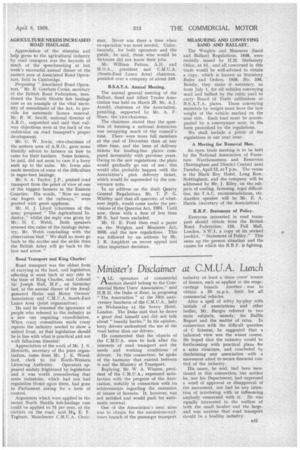Minister's Disclaimer
Page 75

If you've noticed an error in this article please click here to report it so we can fix it.
at GM. U. A. Lunch " ALL LL operators of commercial motors should belong to the Commercial Motor Users' Association," said H.R.H. the Duke of Kent, in proposing "The Association" at the 34th anniversary luncheon of the C.M.U.A., held on Wednesday at the Savoy Hotel, London. The Duke said that he drove a great deal himself and did not talk about" beastly lorries." In his opinion, lorry drivers understood the use of the road better than car drivers.
He commented that the objects of the C.M.U.A. were to look after the interests of road transport and the needs and working conditions of drivers. In this connection, he spoke of the harmony that existed between it and the Ministry of Transport.
Replying, Mr. W. A. Winson, president of the C.M.U.A., expressed satisfaction with the progress of the Association, notably in connection with its achievements regarding the extension of tenure of licences. It, however, was not satisfied and would push for automatic renewal.
One of the Association's next aims was to obtain for the excursions-andtours branch of the passenger transport
industry at least a three years' tenure of licence, such as applied to the stagecarriage branch. Another, was to obtain a 30 m.p.h. limit for all commercial vehicles.
After a spell of witty by-play with initials of associations and other bodies, Mr. Burgin referred to two main subjects, namely, the Baillie Report and the matter of rates. In connection with the difficult question of C liances, he suggested that a balanced view was the wisest course. He hoped that the industry would be forthcoming with practical plans for a rates structure, and concluded by disclaiming any association with a movement afoot to secure financial control of the industry.
His name, he said, had been mentioned in this connection, but neither he, nor his Department, had expressed a word of approval or disapproval of the movement, nor had he any intention of interfering with or influencing anybody concerned with it. He was equally interested in the welfare of both the small haulier and the large, and was anxious that road transport should be a healthy industry.






















































































































